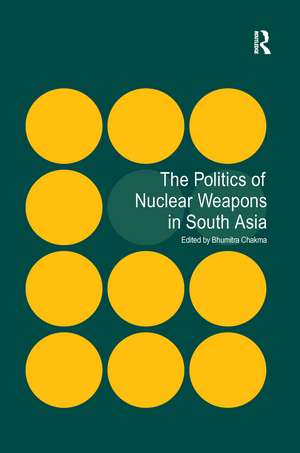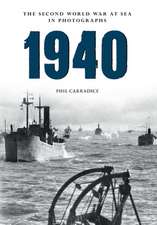The Politics of Nuclear Weapons in South Asia
Editat de Bhumitra Chakmaen Limba Engleză Paperback – 9 sep 2016
| Toate formatele și edițiile | Preț | Express |
|---|---|---|
| Paperback (1) | 489.26 lei 6-8 săpt. | |
| Taylor & Francis – 9 sep 2016 | 489.26 lei 6-8 săpt. | |
| Hardback (1) | 1115.51 lei 6-8 săpt. | |
| Taylor & Francis – 28 aug 2011 | 1115.51 lei 6-8 săpt. |
Preț: 489.26 lei
Nou
Puncte Express: 734
Preț estimativ în valută:
93.63€ • 97.01$ • 78.14£
93.63€ • 97.01$ • 78.14£
Carte tipărită la comandă
Livrare economică 22 martie-05 aprilie
Preluare comenzi: 021 569.72.76
Specificații
ISBN-13: 9781138248830
ISBN-10: 1138248835
Pagini: 278
Dimensiuni: 156 x 234 x 26 mm
Greutate: 0.45 kg
Ediția:1
Editura: Taylor & Francis
Colecția Routledge
Locul publicării:Oxford, United Kingdom
ISBN-10: 1138248835
Pagini: 278
Dimensiuni: 156 x 234 x 26 mm
Greutate: 0.45 kg
Ediția:1
Editura: Taylor & Francis
Colecția Routledge
Locul publicării:Oxford, United Kingdom
Cuprins
Contents: Preface; Introduction, Bhumitra Chakma; Part I Nuclear Deterrence and South Asia: Conceptual and Practical Dimensions: Two decades of minimum deterrence in South Asia: a comparative framework, Rajesh M. Basrur; The road from Pokhran II, Sumit Ganguly; The Pakistani nuclear deterrent, Bhumitra Chakma. Part II Doctrinal Developments: India's nuclear doctrine: 10 years since the Kargil conflict, Swaran Singh; Pakistan's post-test nuclear use doctrine, Bhumitra Chakma. Part III Nuclear Politics: Extra-Regional Linkages and Consequences: The China factor in South Asian nuclear politics, Binoda Kumar Mishra; South Asia's nuclear deterrence and the USA, Bhumitra Chakma; Nuclear proliferation in South Asia and its impact on regional cooperation, Nishchal Nath Pandey and Bhumitra Chakma. Part IV Confidence-Building and Nuclear Arms Control: 'I had gone to Lahore with a message of goodwill but in return we got Kargil': the promise and perils of 'leaps of trust' in India-Pakistan relations, Nicholas J. Wheeler; Nuclear confidence-building measures between India and Pakistan: possible alternatives, Zafar Nawaz Jaspal; Addressing nuclear dangers: confidence building between India, China and Pakistan, Dipankar Banerjee; Nuclear arms control challenges in South Asia, Bhumitra Chakma; Bibliography; Index.
Notă biografică
Bhumitra Chakma, University of Hull, UK
Recenzii
'Pakistan and India have been on the verge of nuclear war several times in the past two decades. This book explores the complexities of their relationship with great clarity and in unparalleled depth. It will be an invaluable resource for anyone seeking accurate, detailed and up-to-date information on the nuclear balance in South Asia.' Peter Mayer, University of Adelaide, Australia 'The Asian subcontinent has, thus far, escaped the unimaginable horrors of nuclear Armageddon. But can the world expect this good fortune to last forever? Or does good fortune have nothing to do with it? This careful study explores the nuclear theory, doctrine, politics, arms control measures, and external pressures that help explain why intense national rivalries and superheated passions so far remain contained.' Robert M. Hathaway, Woodrow Wilson International Center for Scholars, Washington, DC, USA
Descriere
An important and critical re-evaluation of South Asia's post-tests nuclear politics. Unlike other books, this volume emphasises the political dimension of South Asia's nuclear weapons, explains how the bombs are used as politico-strategic assets rather than pure battlefield weapons and how they are employed by India and Pakistan in an extremely complex and competitive South Asian strategic landscape.









